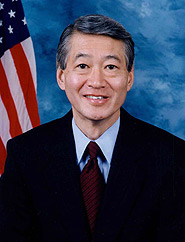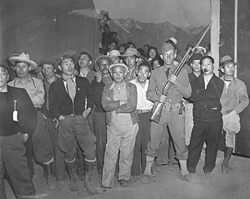Berkeleyan
Matsui's official papers and a new research center come to Berkeley
The long-serving legislator was a Cal grad whose accomplishments in the House included trade pacts and Japanese reparations
![]()
10 January 2007
The papers of the late U.S. Rep. Robert T. Matsui (D-Calif.), including documentation of legislative efforts surrounding the North American Free Trade Agreement, welfare reform, base closures, and Japanese-American reparations, will be donated to the Bancroft Library.
 Robert Matsui |
In conjunction with this gift, the Berkeley campus is launching an effort to establish the Robert T. Matsui Center on Politics and Public Service at the Institute of Governmental Studies.
"Robert Matsui was one of California's most significant political figures and a distinguished Cal alumnus, and we are most grateful for his archive," said Chancellor Robert Birgeneau last week when the announcement was made. "This will be the largest collection of papers at the Bancroft Library from a member of the U.S. House of Representatives, and it will be highly valued by our students and faculty and by visiting researchers."
The center, Birgeneau added, "will reflect his two great passions - promoting public service and better political understanding - and the Matsui family's continuing commitment to that legacy."
U.S. Rep. Doris Matsui (D-Calif.), who, like her husband, attended Berkeley, says the campus is special to her because the couple met here and because "for Bob, it is the place where the ideals of justice and equality he formed in his youth took root to become the founda tion for his lifetime of public service. My hope that Bob's papers will serve as an invaluable resource to researchers on the history of Sacramento and the United States Congress."
"Just as Bob was inspired at Berkeley by President John F. Kennedy's rousing call to public service," she added, "it is my hope that the Robert T. Matsui Center for Politics and Public Service will inspire future generations."
The center will continue Robert Matsui's long tradition of political involvement and public service. It will sponsor lectures and discussions, fund public-service internship opportunities for undergraduates, and promote education and research about American politics and policy. It also will facilitate the interaction of distinguished scholars and figures from government, public service, and politics. Additionally, through programmatic activities at Berkeley and in Sacramento and Washington, D.C., students will gain first-hand experience in the workings of state and federal government.
Thirty years of public service
 The late Rep. Robert Matsui and his family were among thousands of people of Japanese heritage, the majority of them American citizens, forced during World War II to leave their homes for internment camps around the western U.S. This photo from 1942 shows a group of evacuees arriving at Manzanar in California's Owens Valley, one of 10 former camps recently accorded federal protection by incorporation into the National Park System. That legislation enjoyed the strong support of Matsui's successor, his wife, Doris, who was born in an internment camp in Arizona. (Clem Albers photo courtesy the Bancroft Library) |
. Hundreds of pages from his tenure on the Ways and Means Committee that encompass 1990s trade legislation - the North American Free Trade Agreement (NAFTA); the Uruguay Round, which transformed the General Agreement on Tariffs and Trade (GATT) into the World Trade Organization; and a bill that granted Permanent Normalized Trade Relations to China - as well as laws dealing with welfare reform and Social Security.
. Files that document his effort to shepherd the 1988 Japanese-American Redress Act through Congress, by means of which the United States formally apologized for the internment policy it instituted during World War II and provided for a restitution payment to each of the 60,000 then-surviving Japanese-Americans of the 120,000 who were relocated or detained.
. Other legislative files that focus on Sacramento, such as appropriations for flood protection, regional transit, the federal courthouse, and downtown redevelopment; base realignment and closure commissions; and the former Mather and McClellan Air Force bases and the former Sacramento Army Depot.
"The Matsui papers are especially important as they relate to general state and national politics, as well as Japanese-American reparations, Matsui's work on the North American Free Trade Agreement, United States-China relations, and California water issues," said Peter Hanff, deputy director of the Bancroft Library.
Hanff added that the Bancroft has the second official archival set of records maintained by the War Relocation Authority, the civilian agency that during World War II coordinated the relocation of all people of Japanese heritage away from the Pacific Coast. The other set was placed in the National Archives in Washington, D.C. That set of records has been heavily used since about the 1970s, Hanff said, when interest in their contents grew stronger, and it contained the personal data on the internees that was needed to fulfill the terms of the Japanese-American Redress Act.
Other high-ranking elected officials whose papers are at the Bancroft include the late Gov. Edmund G. (Pat) Brown, the late U.S. Sen. Alan Cranston, and the late Gov. and U.S. Sen. Hiram Johnson.

